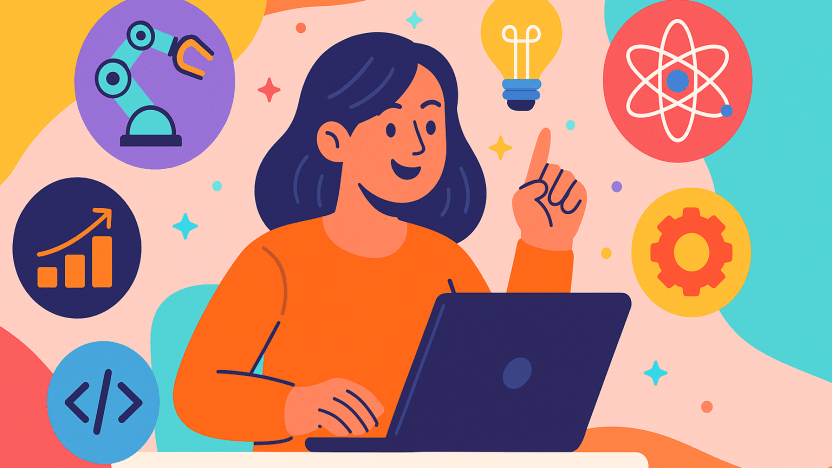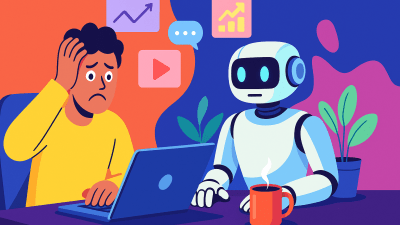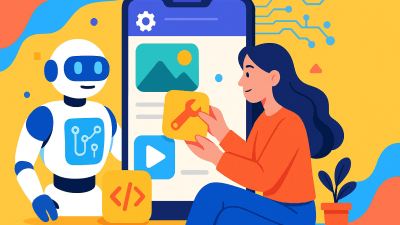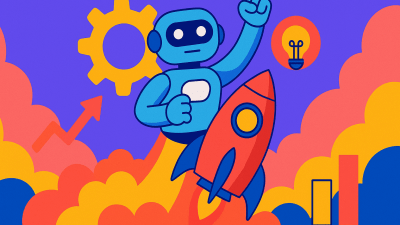The job market in 2025 will be very different from what we know today. While tech entrepreneurs and AI experts are making more money than ever before, recent graduates are facing a worrying 38% unemployment rate, even in fields like computer science that used to be stable, here are some Surprising skills that will help you counter the upcoming changes.
The rules for success are changing. According to Amazon’s CEO, there may come a time when developers no longer need to write traditional code. Instead, they could use English prompts instead of programming languages, which would completely change the way we interact with technology.
This transformation brings both opportunities and challenges:
- AI and automation have the power to completely change industries overnight
- Traditional jobs may vanish while new specialized roles emerge
- Income inequality may increase between those who adapt to these changes and those who don’t
The skills that ensured success in the past may become outdated in the future. However, this disruption also opens up opportunities for innovation and new avenues for professional growth. Those who understand and prepare for these shifts will be better positioned to succeed in an economy where adaptability is key.
The future belongs to those who are willing to embrace new ways of working, thinking, and creating value. The real question is not whether change will happen, but rather if you will be ready when it does.
Surprising Skills for Success in 2025
The job market of 2025 demands a unique blend of skills that might surprise many. Traditional career paths are evolving at lightning speed, creating opportunities in unexpected areas.
1. Leveraging Attention and Trust in a Distracted World
The human attention span has dropped by 50% in the last eight years – a startling reality that shapes our future work landscape. This shift creates a fascinating paradox: attention is becoming our most valuable currency in the digital age.
Building Trust in the Digital Space
- Personal storytelling that resonates with audiences
- Authentic content creation across multiple platforms
- Consistent brand messaging and values alignment
Attention Management Skills
- Creating scroll-stopping content in milliseconds
- Mastering the art of micro-communications
- Developing “thumb-stopping” visual content
The ability to capture and maintain attention isn’t just about flashy content – it’s about creating meaningful connections. Companies now seek professionals who can:
- Design engaging user experiences
- Craft compelling narratives using visual storytelling, such as comics
- Build genuine community engagement
- Navigate the fine line between information and entertainment
Trust-Building Strategies
- Transparent communication practices
- Data-driven credibility building
- Community-focused engagement
- Authentic personal branding
The digital landscape requires professionals who understand attention economics. Success in 2025 belongs to those who can:
- Cut through digital noise effectively
- Build lasting relationships in virtual spaces
- Create content that resonates on a personal level
- Maintain authenticity while scaling reach
These skills transcend traditional industry boundaries – they’re equally crucial for entrepreneurs, corporate professionals, and freelancers. The ability to command attention and build trust becomes a foundational skill, much like digital literacy was in the previous decade.
2. Embracing the Rise of AI and Automation
The AI revolution has created three distinct career paths in the technology landscape:
1. AI Development Specialists
- Algorithm creators and machine learning experts
- Requires deep technical expertise and mathematical proficiency
- Limited but highly specialized job market
2. AI Integration Professionals
- Adapt existing AI models for specific business needs
- Bridge technology with practical applications
- Growing demand across industries
3. AI Tool Users
- Leverage AI applications in daily workflows
- Focus on prompt engineering and efficient tool selection
- Accessible to professionals from various backgrounds
Key skills for thriving alongside AI:
1. Prompt Engineering
- Crafting effective commands for AI tools
- Understanding context and instruction formatting
- Optimizing AI outputs for specific needs
2. AI Tool Proficiency
- ChatGPT and language models
- Image generation platforms
- Automation software
- Data analysis tools
3. Strategic Implementation
- Identifying automation opportunities
- Selecting appropriate AI solutions
- Measuring and optimizing results
The human-AI collaboration landscape demands professionals who can harness these technologies while maintaining critical thinking and creativity. Companies now seek individuals who understand both the capabilities and limitations of AI tools, creating new opportunities for those who adapt to this technological shift.
3. Navigating the Entrepreneurial Landscape
The entrepreneurial landscape of 2025 brings exciting opportunities for those ready to embrace business ownership. Traditional employment structures are shifting, creating space for innovative business models and micro-enterprises.
Key Business Opportunities in 2025:
- Digital-first agencies
- Specialized consulting services
- AI-powered solutions
- Sustainable product ventures
- Virtual education platforms
Business skills have become essential for everyone, not just experts. Teachers, healthcare workers, and creative professionals now require basic business knowledge to succeed in their jobs.
Essential Skills for Modern Entrepreneurs:
- Understanding the market and identifying trends
- Proficiency in digital marketing
- Knowledge of finance and ability to manage money
- Setting prices strategically and positioning products effectively
- Building strong relationships with clients
- Leading remote teams
Starting a business is becoming easier because of:
- Affordable online tools
- Automation powered by artificial intelligence (AI)
- Access to talent from around the world
- Direct sales channels to consumers
- Simple payment systems
In this new environment, success requires both technical expertise and strategic thinking. Entrepreneurs need to understand their target markets in different areas. For example, a creative agency serving clients in the United States can charge higher fees compared to one that only focuses on local markets.
The growth of small businesses and solo entrepreneurs presents unique opportunities. These flexible ventures can quickly adapt to changes in the market and cater to specific niche markets with precision. This shift allows professionals to establish sustainable sources of income while retaining flexibility and creative control.
4. Adapting to New Ways of Working
The traditional 9-to-5 office setup is rapidly becoming a relic of the past. Remote work has evolved from a temporary solution to a permanent fixture in our professional lives. This shift demands a fresh set of skills to thrive in virtual environments:
Digital Communication Mastery
- Crafting clear, concise messages across various platforms
- Reading and conveying non-verbal cues through video calls
- Managing digital body language in virtual meetings
- Building rapport with teammates you’ve never met in person
Virtual Collaboration Tools
- Project management platforms (Asana, Trello, Monday.com)
- Real-time document collaboration
- Digital whiteboarding for creative sessions
- Time zone management across global teams
The ability to maintain productivity while working remotely has become crucial. Successful professionals in 2025 will need to:
- Create dedicated workspaces that boost focus
- Set boundaries between work and personal life
- Practice self-discipline and time management
- Develop routines that maintain mental health
Resilience in Uncertain Times
Remote work brings unique challenges:
- Technical difficulties during crucial presentations
- Internet connectivity issues
- Isolation and reduced social interaction
- Unexpected domestic interruptions
The key lies in developing adaptability – treating each challenge as an opportunity to innovate solutions. Companies now value professionals who can:
- Pivot quickly between different work modes
- Stay productive despite changing circumstances
- Maintain team cohesion in virtual settings
- Create effective async communication systems
These skills transform potential obstacles into stepping stones for career advancement in the evolving digital workplace.
5. Embracing Lifelong Learning as a Core Competency
The rapid pace of technological advancement has transformed learning from a finite academic pursuit into an essential career skill. A growth mindset – the belief that abilities can be developed through dedication and hard work – serves as the foundation for professional success in 2025.
Key Components of Effective Learning:
- Skill Stacking – Building complementary skills that create unique value combinations
- Micro-Learning – Breaking down complex topics into digestible, focused segments
- Experiential Learning – Applying new knowledge through hands-on projects
- Cross-Domain Knowledge – Understanding concepts from multiple fields
Practical Learning Strategies:
- Create a Personal Learning Roadmap
- Identify skill gaps in your industry
- Set specific learning milestones
- Track progress through digital portfolios
- Leverage Digital Learning Platforms
- Professional certification programs
- Industry-specific online courses
- Virtual workshops and webinars
- Build Learning Networks
- Join professional Discord communities
- Participate in virtual mentorship programs
- Contribute to open-source projects
The ability to learn, unlearn, and relearn has become a distinguishing factor between those who thrive and those who struggle in the evolving job market. Companies increasingly value candidates who demonstrate consistent self-improvement and adaptability through their learning journey.
A strategic approach to learning involves identifying emerging trends, experimenting with new tools, and actively seeking feedback from industry peers. This proactive stance toward skill development creates a competitive advantage in an increasingly automated workforce.
Conclusion: Preparing for an Evolving Workforce Landscape
The workforce landscape of 2025 demands a bold, proactive approach to career development. Your success hinges on three critical actions:
- Build your digital presence – Create meaningful content, engage with professional communities, and establish your unique voice across platforms
- Master AI integration – Learn to work alongside AI tools, understand prompt engineering, and leverage automation to enhance your productivity
- Develop business acumen – Whether employed or entrepreneurial, grasp fundamental business concepts to spot opportunities and create value
The path to success lies in viewing change as an opportunity rather than a threat. Start small – dedicate 30 minutes daily to learning a new skill, join online communities in your field, or experiment with emerging technologies. Remember: The most valuable skill is your ability to adapt and evolve.
The future belongs to those who take action today. Pick one skill from this guide and start your journey. The workforce of 2025 needs professionals who embrace change, learn continuously, and dare to reinvent themselves.



